人教新目标2020年中考英语二轮复习学案:专题7 连词
文档属性
| 名称 | 人教新目标2020年中考英语二轮复习学案:专题7 连词 |
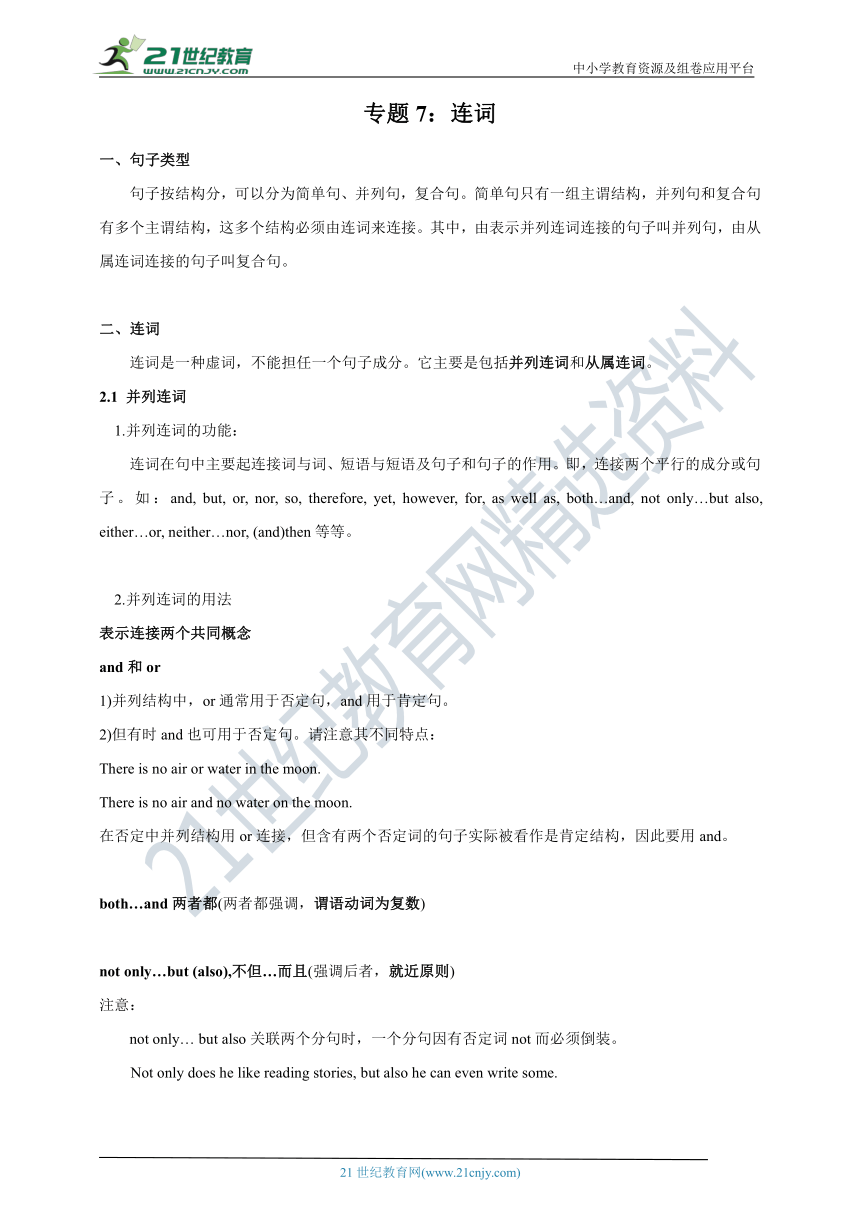
|
|
| 格式 | zip | ||
| 文件大小 | 1.2MB | ||
| 资源类型 | 试卷 | ||
| 版本资源 | 人教新目标(Go for it)版 | ||
| 科目 | 英语 | ||
| 更新时间 | 2020-02-08 21:03:29 | ||
图片预览

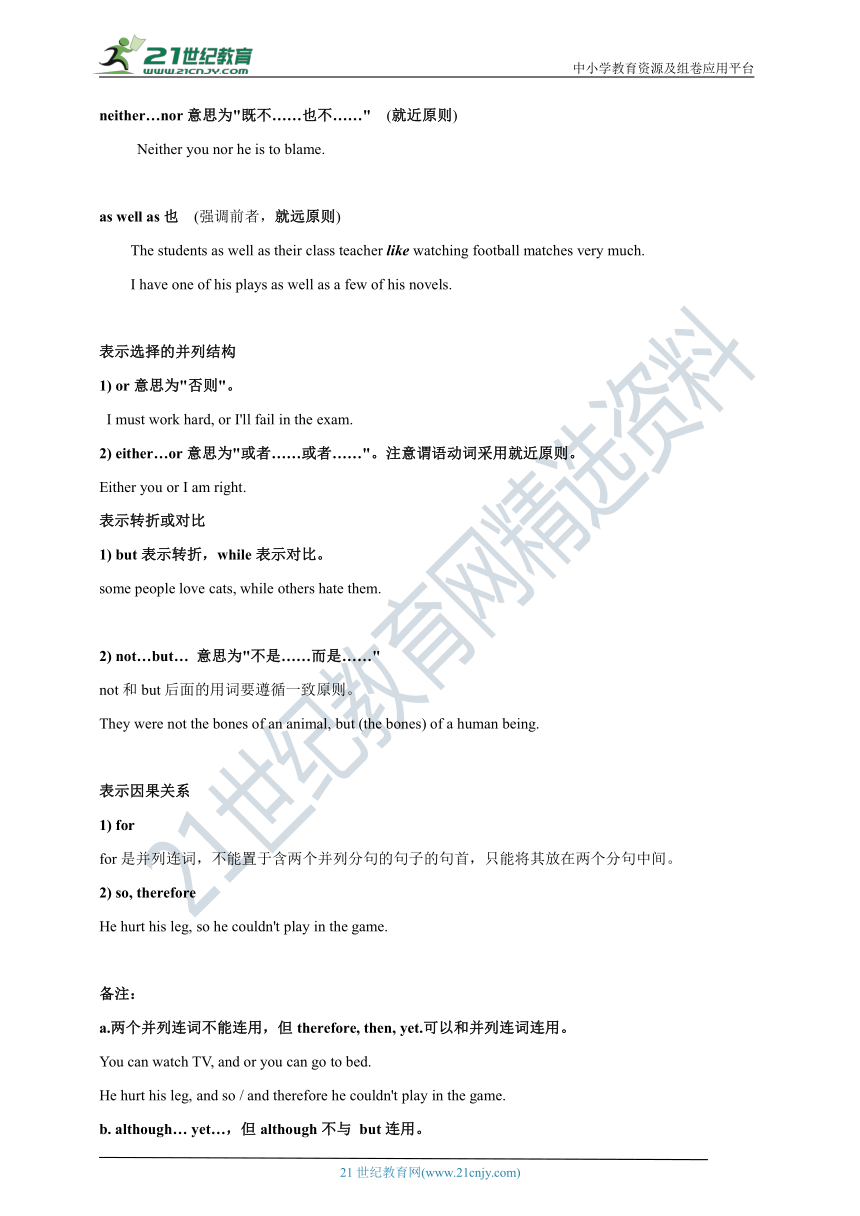
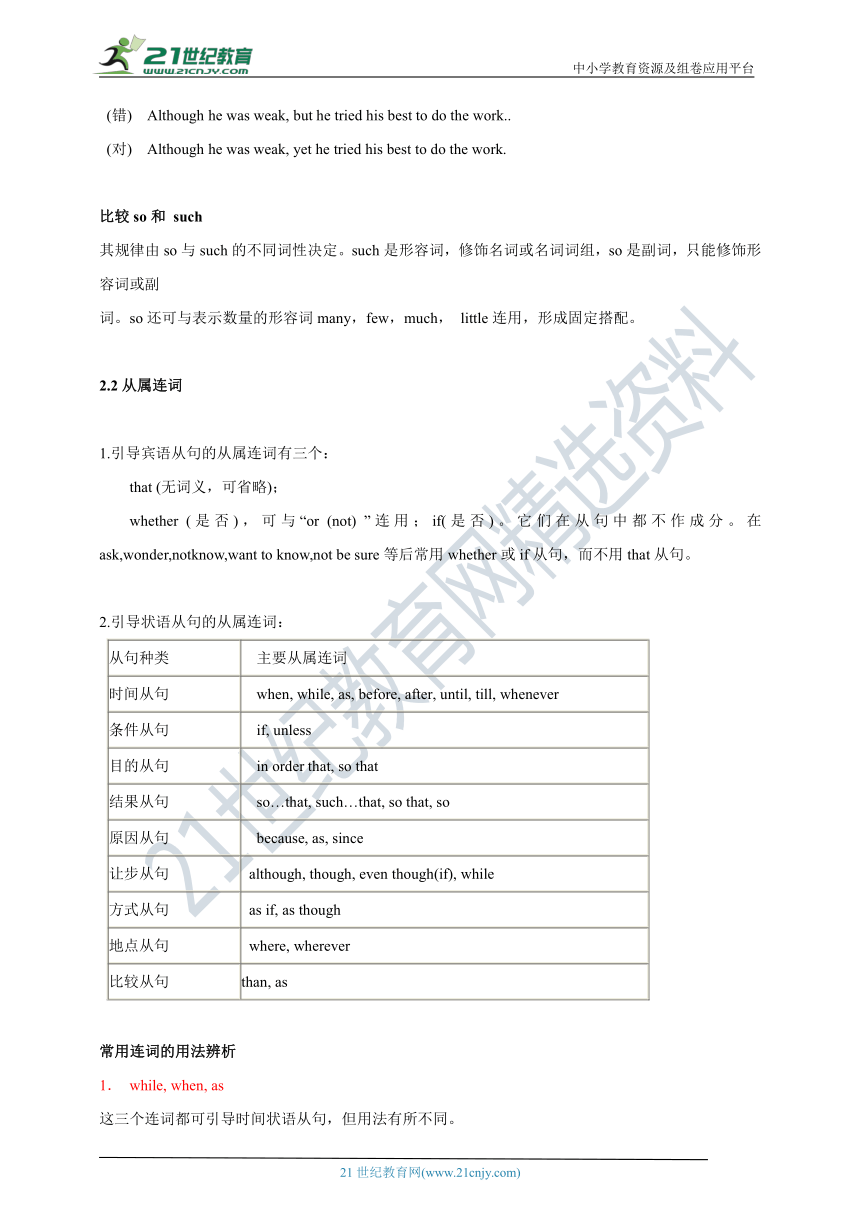
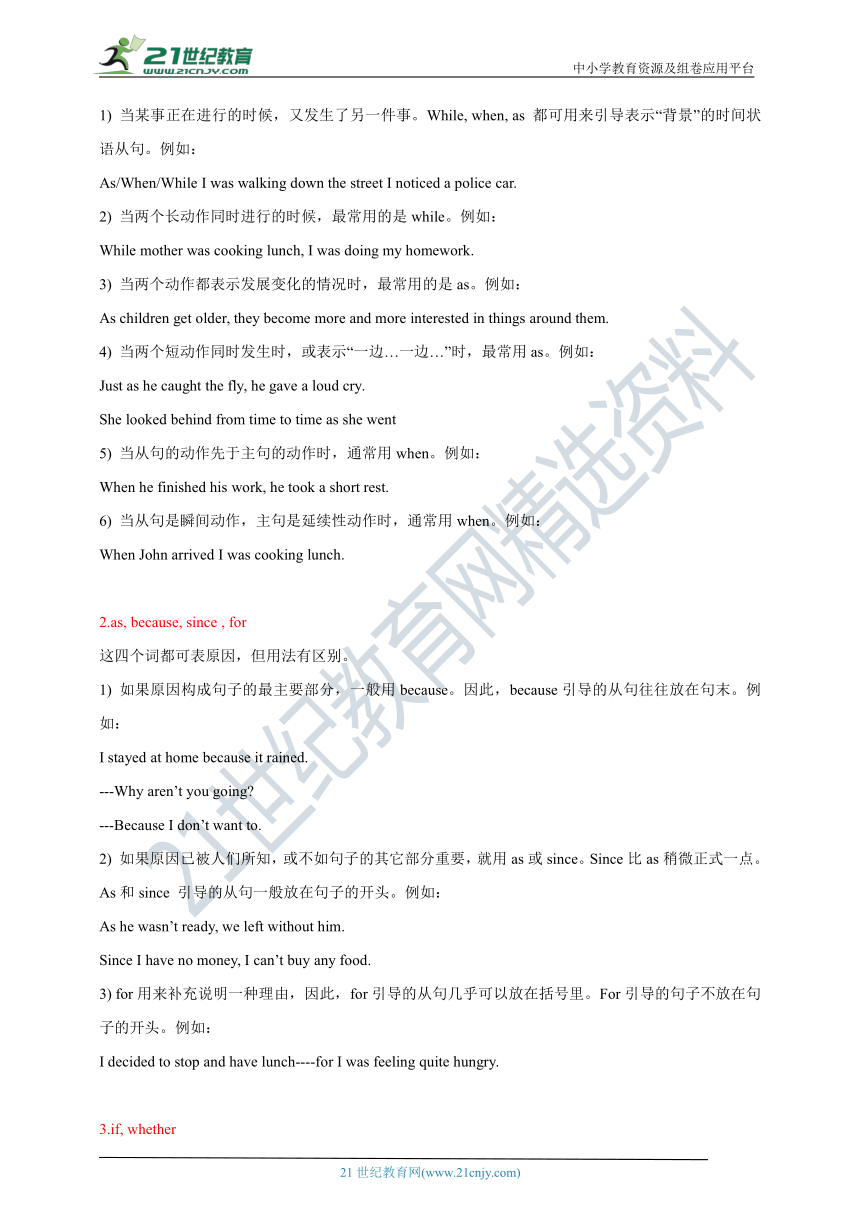
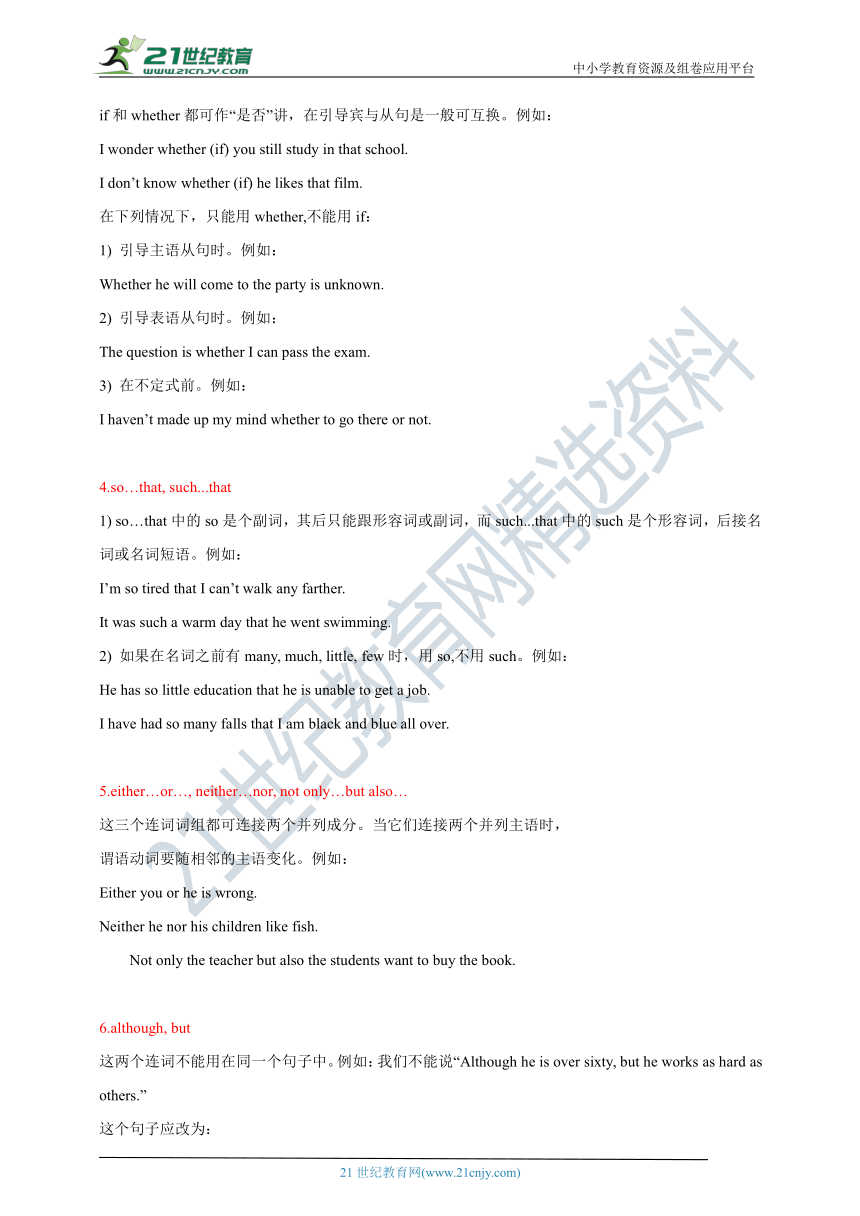
文档简介
中小学教育资源及组卷应用平台
专题7:连词
一、句子类型
句子按结构分,可以分为简单句、并列句,复合句。简单句只有一组主谓结构,并列句和复合句有多个主谓结构,这多个结构必须由连词来连接。其中,由表示并列连词连接的句子叫并列句,由从属连词连接的句子叫复合句。
二、连词
连词是一种虚词,不能担任一个句子成分。它主要是包括并列连词和从属连词。
2.1 并列连词
1.并列连词的功能:
连词在句中主要起连接词与词、短语与短语及句子和句子的作用。即,连接两个平行的成分或句子。如:and, but, or, nor, so, therefore, yet, however, for, as well as, both…and, not only…but also, either…or, neither…nor, (and)then等等。
2.并列连词的用法
表示连接两个共同概念
and和or
1)并列结构中,or通常用于否定句,and用于肯定句。
2)但有时and也可用于否定句。请注意其不同特点:
There is no air or water in the moon.
There is no air and no water on the moon.
在否定中并列结构用or连接,但含有两个否定词的句子实际被看作是肯定结构,因此要用and。
both…and两者都(两者都强调,谓语动词为复数)
not only…but (also),不但…而且(强调后者,就近原则)
注意:
not only… but also关联两个分句时,一个分句因有否定词not而必须倒装。
Not only does he like reading stories, but also he can even write some.
neither…nor意思为"既不……也不……" (就近原则)
Neither you nor he is to blame.
as well as也 (强调前者,就远原则)
The students as well as their class teacher like watching football matches very much.
I have one of his plays as well as a few of his novels.
表示选择的并列结构
1) or意思为"否则"。
I must work hard, or I'll fail in the exam.
2) either…or意思为"或者……或者……"。注意谓语动词采用就近原则。
Either you or I am right.
表示转折或对比
1) but表示转折,while表示对比。
some people love cats, while others hate them.
2) not…but… 意思为"不是……而是……"
not和but后面的用词要遵循一致原则。
They were not the bones of an animal, but (the bones) of a human being.
表示因果关系
1) for
for是并列连词,不能置于含两个并列分句的句子的句首,只能将其放在两个分句中间。
2) so, therefore
He hurt his leg, so he couldn't play in the game.
备注:
a.两个并列连词不能连用,但therefore, then, yet.可以和并列连词连用。
You can watch TV, and or you can go to bed.
He hurt his leg, and so / and therefore he couldn't play in the game.
b. although… yet…,但although不与 but连用。
(错) Although he was weak, but he tried his best to do the work..
(对) Although he was weak, yet he tried his best to do the work.
比较so和 such
其规律由so与such的不同词性决定。such是形容词,修饰名词或名词词组,so是副词,只能修饰形容词或副
词。so还可与表示数量的形容词many,few,much, little连用,形成固定搭配。
2.2从属连词
1.引导宾语从句的从属连词有三个:
that (无词义,可省略);
whether (是否),可与“or (not) ”连用;if(是否)。它们在从句中都不作成分。在ask,wonder,notknow,want to know,not be sure等后常用whether或if从句,而不用that从句。
2.引导状语从句的从属连词:
从句种类 主要从属连词
时间从句 when, while, as, before, after, until, till, whenever
条件从句 if, unless
目的从句 in order that, so that
结果从句 so…that, such…that, so that, so
原因从句 because, as, since
让步从句 although, though, even though(if), while
方式从句 as if, as though
地点从句 where, wherever
比较从句 than, as
常用连词的用法辨析
1. while, when, as
这三个连词都可引导时间状语从句,但用法有所不同。
1) 当某事正在进行的时候,又发生了另一件事。While, when, as 都可用来引导表示“背景”的时间状语从句。例如:
As/When/While I was walking down the street I noticed a police car.
2) 当两个长动作同时进行的时候,最常用的是while。例如:
While mother was cooking lunch, I was doing my homework.
3) 当两个动作都表示发展变化的情况时,最常用的是as。例如:
As children get older, they become more and more interested in things around them.
4) 当两个短动作同时发生时,或表示“一边…一边…”时,最常用as。例如:
Just as he caught the fly, he gave a loud cry.
She looked behind from time to time as she went
5) 当从句的动作先于主句的动作时,通常用when。例如:
When he finished his work, he took a short rest.
6) 当从句是瞬间动作,主句是延续性动作时,通常用when。例如:
When John arrived I was cooking lunch.
2.as, because, since , for
这四个词都可表原因,但用法有区别。
1) 如果原因构成句子的最主要部分,一般用because。因此,because引导的从句往往放在句末。例如:
I stayed at home because it rained.
---Why aren’t you going?
---Because I don’t want to.
2) 如果原因已被人们所知,或不如句子的其它部分重要,就用as或since。Since比as稍微正式一点。As和since 引导的从句一般放在句子的开头。例如:
As he wasn’t ready, we left without him.
Since I have no money, I can’t buy any food.
3) for用来补充说明一种理由,因此,for引导的从句几乎可以放在括号里。For引导的句子不放在句子的开头。例如:
I decided to stop and have lunch----for I was feeling quite hungry.
3.if, whether
if和whether都可作“是否”讲,在引导宾与从句是一般可互换。例如:
I wonder whether (if) you still study in that school.
I don’t know whether (if) he likes that film.
在下列情况下,只能用whether,不能用if:
1) 引导主语从句时。例如:
Whether he will come to the party is unknown.
2) 引导表语从句时。例如:
The question is whether I can pass the exam.
3) 在不定式前。例如:
I haven’t made up my mind whether to go there or not.
4.so…that, such...that
1) so…that中的so是个副词,其后只能跟形容词或副词,而such...that中的such是个形容词,后接名词或名词短语。例如:
I’m so tired that I can’t walk any farther.
It was such a warm day that he went swimming.
2) 如果在名词之前有many, much, little, few时,用so,不用such。例如:
He has so little education that he is unable to get a job.
I have had so many falls that I am black and blue all over.
5.either…or…, neither…nor, not only…but also…
这三个连词词组都可连接两个并列成分。当它们连接两个并列主语时,
谓语动词要随相邻的主语变化。例如:
Either you or he is wrong.
Neither he nor his children like fish.
Not only the teacher but also the students want to buy the book.
6.although, but
这两个连词不能用在同一个句子中。例如:我们不能说“Although he is over sixty, but he works as hard as others.”
这个句子应改为:
Although he is over sixty, he works as hard as others.
或He is over sixty, but he works as hard as others.
7.because, so
这两个连词同样不能用在同一个句子中。例如:我们不能说“Because John was ill, so I took him to the doctor.”
这个句子应改为
Because John was ill, I took him to the doctor.
或John was ill, so I took him to the doctor.
3.定语从句、名词性从句也有其自己相应的从属连词,这个在高中会详细讲解,这里不展开。
状语从句
★条件状语从句
【经典剖析】
1.条件状语从句用一般现在时表示将来。引导条件状语从句的连词有:
if 如果;unless除非,如果不;on condition that条件是;as long as只要
2.表示正面的条件用if“如果”。
If you don't look after young trees, they will die very quickly. 如果你不好好照看小树苗,它们就会很快死去。
If the museum charges for entry, a lot of people won't be able to visit it. 如果进入博物馆要收费,许多人就参观不成了。
3.表示否定的条件用unless( =if...not)“除非,如果不”。
I shall not go to the cinema unless I finish my homework before eight. 我不会去看电影,除非我能在8点前完成作业。
说明:if…not常可以用unless替代。
If you don’t study hard, you will fail in the exam.
You will fail in the exam unless you study hard.
4.表示使某事成为现实必要的条件用on condition that“条件是”,as long as ‘‘只要”。
You may go swimming on condition that you don't swim too far away from the river bank.
你可以去游泳,条件是你不能游得离河岸太远。
As long as you keep on trying, you will surely succeed. 只要你继续尝试就一定能成功。
因此,我们不能说:
As long as you don't study hard, you will fail in the exam.
5.祈使结构表条件。
前半部分的祈使结构相当于if条件句,可用动词或名词开头;后半部分的简单句常用一般将来时,有时也用一般现在时。此句型与条件状语从句形成同义结构。
1)祈使句( , ) +and/then+简单句=> if 从句(否定式)+主句
Give me somewhere to stand, and I will move the earth.(如果)给我一个支点,我便能掀动地球。
=If you give me somewhere to stand, I will move the earth.
One more word, and I'll turn you out. 你再多说一句,我就把你赶出去。
=If you speak one more word, I will turn you out.
Use your head, then you'll find a way. 动动脑子你就能找到办法。
=If you use your head, you'll find a way.
2)祈使句(,)+or+简单句=> if 从句(否定式)+主语
Work even harder, or you will never pass the exam. 如果不加倍努力,你就永远无法通过考试。
= If you don't work harder, you will never pass the exam.
Stop telling lies, or you will be punished. 如果你继续说谎,就会受到惩罚。
= If you don't stop telling lies, you will be punished.
例题精讲:
1) — Would you like to go to the park with me, Susan?
— I'd like to, you don't want to go alone.
A. until B. before C. if D. after
2) Tomorrow we'll go to the city park it is sunny.
A. as soon as B. when C. if D. as
3) All of us will be happy you can come with us.
A. while B. if C. but D. or
4) Nobody can learn English well you work hard on it.
A. if B. unless C. when D. but
5) The sports meet will continue it rains this afternoon.
A. if B. since C. as soon as D. unless
【Keys】
1) C 2) C 3) B 4) B 5) D
原因状语从句和地点状语从句
1.原因状语从句
引导原因状语从句的连词有:
because, for, since, as, now that
1) because意为“因为”,表示直接的原因或理由,着重点在从句,用于回答why,语气最强。
He is absent today because he is ill. 他今天缺席,因为他病了。
I didn't go out because I was busy with homework. 我没有出去,因为我忙于家庭作业。
有时,可用because of后接名词或代词表示原因,此时because of=for(介词)。
We won't be able to come because of the weather. 由于天气的原因,我们来不了。
She was looking all the better for her stay in hospital. 她因为待在医院,显得好多了。
2) for意为“因为”,引导的从句并不说明主句行为发生的直接原因,只提供补充说明,且不可位于主句前。for前往往用逗号或分号与主句分开,引起的从句对主句加以解释。
I didn't go to see him, for a heavy snow was falling. 我没有去看他,因为在下大雪。
The days were short, for it was now December. 白天短了,因为现在已经是十二月了。
We must begin planning now, for the future may bring unexpected changes.
我们必须现在就开始筹划,因为将来可能会发生意想不到的变化。
有时,for引起的从句并不表示原因,而是表示一种推断或解释,而because则不能。
Someone in the house must be ill, for a doctor has just come out.房子里一定有人病了,因为有个医生刚刚出来。
3) since意为“既然”、“由于”,一般表示对方已知的、无需加以说明的既成事实的理由(如果从句表示的原因不是确定的事实,就不能用since,通常用because)。
Since you are going, I will go too. 既然你要走,我也走了。
Since you are ill, I'll go alone. 由于你病了,我就一个人走了。
4) as意为“由于”,表示十分明显的原因,一般说明因果关系,着重点在主句,语气较弱。
As it is snowing, we shall not go to the park. 由于正在下雪,我们就不去公园了。
He had to apologize, as he knew he had made a mistake. 他必须道歉,因为他知道他错了。
由as表示的原因语势最弱,常用于口语。
5) now that意为“既然”,有时可将that省去,含义与since接近。区别在于:since表示原先已存在的情况,而now that表示现在才发生的情况。
Now that it has stopped raining, let's start at once. 既然现在雨停了,咱们马上开始吧!
Now that you have come, you may as well stay. 既然来了,你最好还是待在这儿。
2.地点状语从句
引导地点状语从句的连词有: where, wherever, anywhere, everywhere
Put it where you can see it. 把它放在你看得见的地方。
I'll find him, wherever he is. 不管他在哪里我都要找到他。
You should put the book where it was.你应该把书放在原来的地方。
Wherever you go, you should do your work well. 不论你到哪里都要把工作做好。
You can’t camp anywhere/where/ wherever you like.你不能想在哪里安营就在哪里安营。
1) I hope to go to France some day there are many famous museums there.
A. though B. unless C. because D. where
2) — Would you like to go to the concert with me?
— I'd love to, I can't. I have a lot of homework to do.
A. and; Because B. but; Because C. so; And D. and; so
3) Jim has been in the factory for two years____________ he left school.
A. when B. since C. as soon as D. whether
4) Jack was very tired he played tennis all afternoon.
A. if B. as soon as C. because D. before
5) You'd better come back earlier it is getting colder.
A. as B. and C. but D. or
6) Jane wore a raincoat it was raining.
A. so B. but C. however D. because
7) The Italian boy was regarded as a hero he gave his life for his country.
A. according to B. because of C. on account of D. because
【Keys】
1) C 2) B 3) B 4) C 5) A 6) D 7) D
让步状语从句
1.引导让步状语从句的连词有:
although, while, even though, even if, whether... (or not), 用no matter十wh-/how 引导
2.although/though“虽然”。
Although I didn’t know anybody at the party, I had a very good time. 虽然晚会上的客人我一个也不认识,但我玩得很愉快。
[注意]“although…but”是个典型的错误,因为but是并列连词,不能与从属连词although连用。但是,although可与yet,still连用,因为yet,still是副词,它可使前后关系更明确。
3.while意为“然而”。
1) while用于对照,说明两种情况相反,意为“然而,但是”。
Tom is very outgoing, while Jane is shy and quiet.汤姆性格外向,而简却腼腆安静。
While I was reading, he was playing. 我在读书,而他在玩。
2) while意为“虽然,尽管”,同although,此时从句和主句的主语往往为同一人或物。
While she liked cats。she never let them come into her room.虽然她喜欢猫,但她从不让猫进她的房间。
4.even if “即使”(if后陈述的是假设);even though“尽管”(though后陈述的是事实)。
I'm going to apply for the job, even if it pays very little. 即使报酬不高,我也要去申请那份工作。
He is an honest man, I say, even though I have opposed him. 我说他是个诚实的人,尽管我反对过他。
5.whether…(or not)“无论是……或是……”.
Whether it rains or not, I shall go out for an outing. 无论是否下雨,我都要外出游玩。
Whether we win or lose, we are going to do our best. 无论胜败,我们都会尽最大努力。
[注意] whether作“无论”解,用现在时表将来;whether作“是否”解时则不能。
They'll go out whether it rains or not tomorrow. 无论明天是否下雨,他们都要出去。
Can you tell me whether it will rain or not tomorrow? 你能告诉我明天是否下雨吗?
6.用no matter+ wh-/how的词引导,意为“无论”。
no matter who无论谁,no matter which无论哪一,no matter what无论什么, no matter when无论何时,no matter where无论哪里,no matter how无论怎样
No matter who you are, you must obey the law. 无论你是谁,你都应当遵纪守法。
No matter where you are, you must remember you are a League member. 无论你在哪里,你都应当记住你是一个团员。
It has the same result no matter which way you do it. 无论用什么方法来做,结果都一样。
No matter what happens, we'll never lose heart.不管发生什么,我们永远不会灰心。
You can always find him working at the desk no matter when you go to see him.
无论什么时候你去看他,总会发现他坐在桌边工作。
No matter how cold it is, she often goes swimming.无论有多冷,她总是常去游泳。
1) he's old, he can still carry this heavy bag.
A. Though B. Since C. For D. So
2) — How do you like the concert given by the "Foxy Ladies"?
— Exciting, one piece of the music wasn't played quite well.
A. so B. though C. because D. and
3) — Shall we go on working?
— Yes, I prefer to have a rest.
A. when B. if C. because D. though
4) Doctor Li went to see the patient it was raining heavily.
A. because B. and C. since D. though
5) — This dress was last year's style.
— I think it still looks perfect it has gone out this year.
A. so that B. even though C. as if D. ever since
6) No matter busy he is, he won't give up his hobby.
A. where B. how C. what D. who
7) I never seem to lose any weight, hard I try.
A. even though B. no matter how C. as if D. ever since
8) No matter you come, you are welcome.
A. how B. where C. when D. what
9) Though it's raining, are still working in the fields.
A. they B. but they C. and they D. so they
10) Nobody believed him what he said.
A. even though B. in spite C. no matter D. contrary to
11) what may happen, I won't change my mind.
A. Even if B. Although C. Perhaps D. No matter
【Keys】
2. 1) A 2) B 3) D 4) D 5) B 6) B7)B 8) C 9) A 10) C 11) D
目的、结果、比较状语从句
【经典剖析】
1.引导目的状语从句的连词有: in order that目的是为了,so that,以便
以in order that,so that引导的目的状语从句谓语通常用may,might加动词构成,也可用can/ could或will/would加动词构成。
He works hard in order that he can serve his country well. 他努力工作,目的是为了能更好地为国家服务。
They started early so that they might arrive in time. 他们很早出发,以便按时到达。
[注意]“for+动名词”不用于表目的,但“for+名词”可用于表目的。
Write it in simple English to make(不能用for making) everybody understand. 为了能让每个人都理解,请用简单的英语写。
Better get up early for the early train. 为了能赶上早班火车,请早一点起床。
2.引导结果状语从句的词: so that以致,so…that如此……以致,such…that如此……以致
He made a wrong decision, so that half of his property was lost. 他做了个错误的决定,以至于他丢失了一半的财产。
The box is so heavy that nobody can move it. 这个箱子是如此重,(以至于)无人能移动它。
It is such a heavy box that nobody can move it. 这个箱子如此重,(以至于)无人能移动它。
[注意]so that既可引导目的状语从句,又可引导结果状语从句,其区别在于:引导结果状语从句时通常用逗号同主句分开。
3.引导比较状语从句的词有:
than比,as…as“像……一样”,not so…as“不像……一样”,the more…the more“越……越”
I know you better than he does. 我比他更了解你。
We walked as fast as we could. 我们尽可能地快步行走。
The work is not so easy as you thought. 这工作没有你想的那么简单。
Nothing is so precious as health没有什么能像健康一样珍贵。
The harder you study, the greater progress you will make. 你越努力学习,进步就越大。
选择最佳答案填空:
1) I'll leave him a note he'll know where we are.
A. so that B. so as C. in order D. for
2) The question was difficult that nobody could answer .
A. very; them B. very; it C. so; them D. so; it
3) Mike is boy that we all like him.
A. a good so B. so good a C. a such good D. such good a
4) They were busy studying they couldn't go to the restaurant with us.
A. so; that B. such; as C. very; that D. enough; as
5) It was that he had to ask for help.
A. so difficult work B. so difficult a work
C. such a difficult work D. such a difficult job
6) He started early he could get there before nine.
A. in order that B. because C. so as to D. in order to
7) Robert is good at languages, we all know.
A. because B. for C. as D. since
8) It looks it's going to rain.
A. that B. as C. as if D. that
【Keys】
1. 1) in order that 2) so that 3) so... that 4) so... that 5) such... that
2. 1)A 2) D 3) B 4) A 5) D 6) A 7) C 8) C
21世纪教育网 www.21cnjy.com 精品试卷·第 2 页 (共 2 页)
HYPERLINK "http://21世纪教育网(www.21cnjy.com)
" 21世纪教育网(www.21cnjy.com)
同课章节目录
- 词法
- 名词
- 动词和动词短语
- 动词语态
- 动词时态
- 助动词和情态动词
- 非谓语动词
- 冠词
- 代词
- 数词和量词
- 形容词副词及其比较等级
- 介词和介词短语
- 连词和感叹词
- 构词法
- 相似、相近词比较
- 句法
- 陈述句
- 一般疑问句和否定疑问句
- 特殊疑问句及选择疑问句
- 反意疑问句
- 存在句(There be句型)
- 宾语从句
- 定语从句
- 状语从句
- 主谓一致问题
- 简单句
- 并列句
- 复合句
- 主谓一致
- 主、表语从句
- 名词性从句
- 直接引语和间接引语
- 虚拟语气
- 感叹句
- 强调句
- 倒装句
- 祈使句
- 句子的成分
- 句子的分类
- 题型专区
- 单项选择部分
- 易错题
- 完形填空
- 阅读理解
- 词汇练习
- 听说训练
- 句型转换
- 补全对话
- 短文改错
- 翻译
- 书面表达
- 任务型阅读
- 语法填空
- 其他资料
